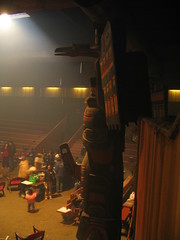I’ve been working a lot with youth over the my career in all kinds of fields. This week I got another chance to work with the members of the teens and 20s leadership generation at an event hosted by Cool Vancouver, which is the City of Vancouver’s sustainability plan around greenhouse gas reductions.
I am working with the excellent friends at Karyo Communications, who are logistics wizards, and do they ever know how to write invitations. We put out an invitation to the world and got 160 youth showing up on Wednesday evening to discuss tapping youth leadership to make the strategy hum. We used the World Cafe process to tap the wisdom of these youth, and we got a ton of amazing ideas, from the large scale to the small scale. My favourite small scale idea was for people to buy a universal remote and to go around the city to bars and restaurants and banks and turn off the TV’s that sit in the corner constantly on, with no one watching them.
Some of us who are in our thirties were watching these conversations unfold around us and wondering what is different about this generation of youth leadership. When we were younger we had lots of high ideals, but it seems like active folks in their teens and 20s are combining that with much better information about their causes, thanks to the internet, and eminently practical local solutions. There were a few calls for the downfall of capitalism, but most of the folks who were there had much more do-able local strategies.
Culture jamming, the web, networked advocacy and Cluetrain are all tools of empowerment for young leaders. To my eye, watching them work this week, I think there is an additional factor too, and that is that there seems to be so much more at stake for them NOT to act. I get the sense that young activists are emerging out of a world whose ills are incurable by traditional means and they are emerging into a way of being that sees their own personal leadership and power as the only option for change. No one is going to undo the damage willingly, and no one will listen to and support what these youth are saying and yet they know that every year we wait for a new globlal/local mindset to appear is one less year of opportunity for change. The lack of attention to their causes is the most freeing aspect of their work. They channel their energy into their work.
What is notable about this dance on the edge is that, unlike the 1980s when we llived in terror of nuclear mistakes, there seems to be a lack of fear. Many of these younger folks are fearless at the current state of the world. Call it blind optimism or hope, but to my eye it seems like we are encountering a generation that will be leading our worlds into a place where the only way things change is if we make it happen, and that means choosing small ways to start big things, and doing what you can where you can.
I might be wrong but those of you out there that work with youth can probably confirm something of a shift in approach. How would you label it?


